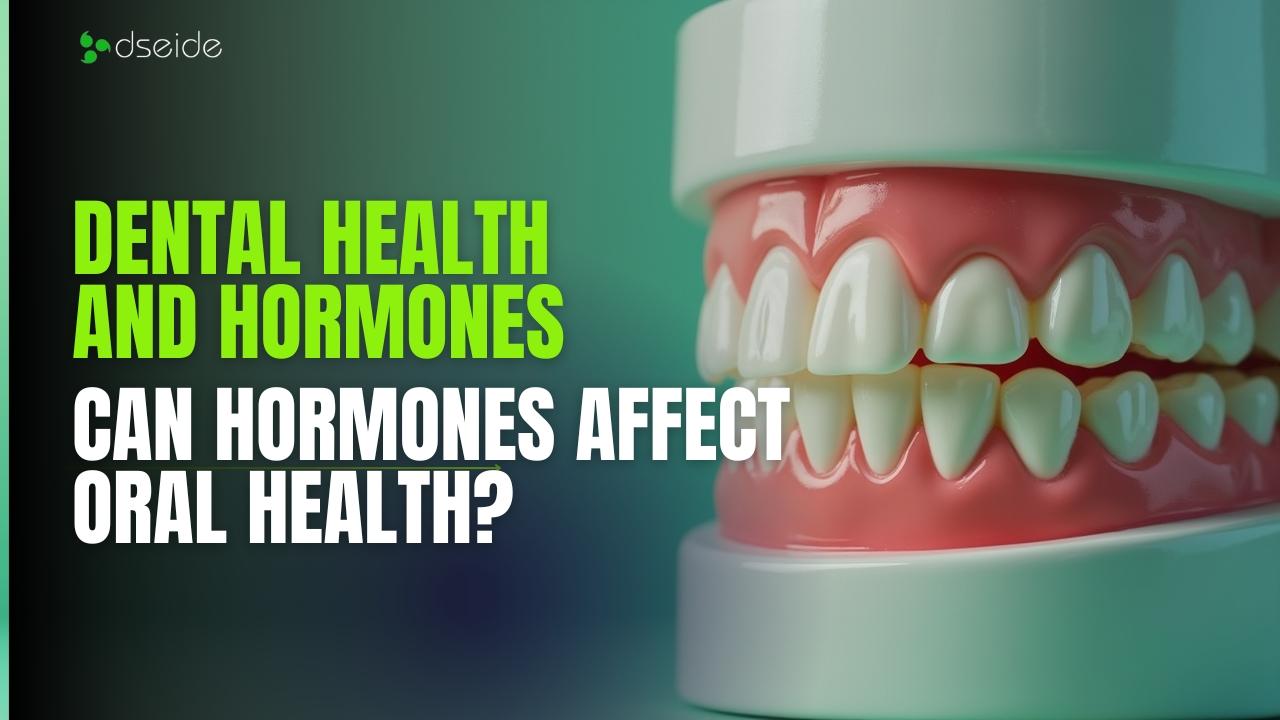Dental Health and Hormones: Can Hormones Affect Oral Health?
Hormonal fluctuations throughout a person’s life can have a significant impact on oral health, particularly for women. Changes in hormone levels can make gums more sensitive and susceptible to plaque, leading to oral health issues. Understanding the connection between hormonal health and dental care is key to maintaining a healthy smile, especially during key phases like pregnancy, menopause, and beyond.
1. Brushing and Flossing: The Basics
While it may seem obvious, brushing and flossing daily are essential practices in maintaining oral health, especially during hormonal changes. Hormonal fluctuations can increase the risk of plaque buildup, which is the main cause of gingivitis and cavities. Consistently removing plaque with proper oral hygiene can help reduce these risks.
2. Smile Through the Storm: Oral Health During Pregnancy
During pregnancy, estrogen and progesterone levels surge, making gums more susceptible to inflammation. This can result in pregnancy gingivitis, a condition characterized by swollen, tender, and sometimes bleeding gums. It’s important to maintain an oral hygiene routine and visit your dentist regularly to prevent or manage these symptoms during pregnancy.
3. Now, Let’s Talk About Menopause
Menopause brings its own set of oral health challenges. One of the most common is dry mouth, a condition where saliva production decreases. Saliva plays a crucial role in washing away harmful bacteria and keeping the mouth healthy. Without enough saliva, bacteria can accumulate, increasing the risk of cavities and other dental issues. For some women, hormonal changes during menopause may also contribute to the loosening or even loss of teeth. If these symptoms become frequent or severe, it’s important to consult a dentist for proper guidance and care.
4. Diet: A Key Player in Oral Health
Your diet plays a crucial role in your overall oral health, particularly during times of hormonal change. Sugary foods and beverages can fuel plaque bacteria, contributing to tooth decay and gum disease. But it’s not just about avoiding certain foods; making conscious dietary choices can greatly benefit your oral health. Focus on consuming nutrient-rich foods that promote gum health, such as leafy greens, dairy products, and foods high in calcium and vitamin D. These can support the health of your teeth and gums as your hormones fluctuate.
5. Regular Dental Checkups: Stay Ahead of the Curve
Routine dental visits become even more important when your body is experiencing hormonal changes. Regular checkups allow your dentist to catch potential problems early and provide personalized advice based on your unique dental needs. A proactive approach to oral health can help manage the effects of hormones on your teeth and gums.
6. Dry Mouth Relief
If you are dealing with dry mouth due to hormonal changes, don’t hesitate to ask your dentist for solutions. They can prescribe specialized mouthwashes or lozenges to help stimulate saliva production. Open communication with your dentist ensures that you can maintain good oral health, even when hormonal shifts complicate matters. Remember, your dentist is there to listen and support you through your health journey.
In Summary
Hormones can have a surprising impact on your oral health, especially during pregnancy and menopause. By maintaining a strong oral hygiene routine, visiting your dentist regularly, and making smart dietary choices, you can protect your teeth and gums through every phase of life.
If you’re experiencing any unusual symptoms related to hormonal changes, such as gum sensitivity, dry mouth, or other oral health issues, be sure to speak with your dentist. They can help tailor your dental care to your body’s needs, ensuring your smile stays bright and healthy.
Stay informed, take control of your oral health, and keep smiling through every stage of life!
source:- goognight sleep
Hormonal fluctuations throughout a person’s life can have a significant impact on oral health, particularly for women. Changes in hormone levels can make gums more sensitive and susceptible to plaque, leading to oral health issues. Understanding the connection between hormonal health and dental care is key to maintaining a healthy smile, especially during key phases like pregnancy, menopause, and beyond.
1. Brushing and Flossing: The Basics
While it may seem obvious, brushing and flossing daily are essential practices in maintaining oral health, especially during hormonal changes. Hormonal fluctuations can increase the risk of plaque buildup, which is the main cause of gingivitis and cavities. Consistently removing plaque with proper oral hygiene can help reduce these risks.
2. Smile Through the Storm: Oral Health During Pregnancy
During pregnancy, estrogen and progesterone levels surge, making gums more susceptible to inflammation. This can result in pregnancy gingivitis, a condition characterized by swollen, tender, and sometimes bleeding gums. It’s important to maintain an oral hygiene routine and visit your dentist regularly to prevent or manage these symptoms during pregnancy.
3. Now, Let’s Talk About Menopause
Menopause brings its own set of oral health challenges. One of the most common is dry mouth, a condition where saliva production decreases. Saliva plays a crucial role in washing away harmful bacteria and keeping the mouth healthy. Without enough saliva, bacteria can accumulate, increasing the risk of cavities and other dental issues. For some women, hormonal changes during menopause may also contribute to the loosening or even loss of teeth. If these symptoms become frequent or severe, it’s important to consult a dentist for proper guidance and care.
4. Diet: A Key Player in Oral Health
Your diet plays a crucial role in your overall oral health, particularly during times of hormonal change. Sugary foods and beverages can fuel plaque bacteria, contributing to tooth decay and gum disease. But it’s not just about avoiding certain foods; making conscious dietary choices can greatly benefit your oral health. Focus on consuming nutrient-rich foods that promote gum health, such as leafy greens, dairy products, and foods high in calcium and vitamin D. These can support the health of your teeth and gums as your hormones fluctuate.
5. Regular Dental Checkups: Stay Ahead of the Curve
Routine dental visits become even more important when your body is experiencing hormonal changes. Regular checkups allow your dentist to catch potential problems early and provide personalized advice based on your unique dental needs. A proactive approach to oral health can help manage the effects of hormones on your teeth and gums.
6. Dry Mouth Relief
If you are dealing with dry mouth due to hormonal changes, don’t hesitate to ask your dentist for solutions. They can prescribe specialized mouthwashes or lozenges to help stimulate saliva production. Open communication with your dentist ensures that you can maintain good oral health, even when hormonal shifts complicate matters. Remember, your dentist is there to listen and support you through your health journey.
In Summary
Hormones can have a surprising impact on your oral health, especially during pregnancy and menopause. By maintaining a strong oral hygiene routine, visiting your dentist regularly, and making smart dietary choices, you can protect your teeth and gums through every phase of life.
If you’re experiencing any unusual symptoms related to hormonal changes, such as gum sensitivity, dry mouth, or other oral health issues, be sure to speak with your dentist. They can help tailor your dental care to your body’s needs, ensuring your smile stays bright and healthy.
Stay informed, take control of your oral health, and keep smiling through every stage of life!
source:- goognight sleep
Dental Health and Hormones: Can Hormones Affect Oral Health?
Hormonal fluctuations throughout a person’s life can have a significant impact on oral health, particularly for women. Changes in hormone levels can make gums more sensitive and susceptible to plaque, leading to oral health issues. Understanding the connection between hormonal health and dental care is key to maintaining a healthy smile, especially during key phases like pregnancy, menopause, and beyond.
1. Brushing and Flossing: The Basics
While it may seem obvious, brushing and flossing daily are essential practices in maintaining oral health, especially during hormonal changes. Hormonal fluctuations can increase the risk of plaque buildup, which is the main cause of gingivitis and cavities. Consistently removing plaque with proper oral hygiene can help reduce these risks.
2. Smile Through the Storm: Oral Health During Pregnancy
During pregnancy, estrogen and progesterone levels surge, making gums more susceptible to inflammation. This can result in pregnancy gingivitis, a condition characterized by swollen, tender, and sometimes bleeding gums. It’s important to maintain an oral hygiene routine and visit your dentist regularly to prevent or manage these symptoms during pregnancy.
3. Now, Let’s Talk About Menopause
Menopause brings its own set of oral health challenges. One of the most common is dry mouth, a condition where saliva production decreases. Saliva plays a crucial role in washing away harmful bacteria and keeping the mouth healthy. Without enough saliva, bacteria can accumulate, increasing the risk of cavities and other dental issues. For some women, hormonal changes during menopause may also contribute to the loosening or even loss of teeth. If these symptoms become frequent or severe, it’s important to consult a dentist for proper guidance and care.
4. Diet: A Key Player in Oral Health
Your diet plays a crucial role in your overall oral health, particularly during times of hormonal change. Sugary foods and beverages can fuel plaque bacteria, contributing to tooth decay and gum disease. But it’s not just about avoiding certain foods; making conscious dietary choices can greatly benefit your oral health. Focus on consuming nutrient-rich foods that promote gum health, such as leafy greens, dairy products, and foods high in calcium and vitamin D. These can support the health of your teeth and gums as your hormones fluctuate.
5. Regular Dental Checkups: Stay Ahead of the Curve
Routine dental visits become even more important when your body is experiencing hormonal changes. Regular checkups allow your dentist to catch potential problems early and provide personalized advice based on your unique dental needs. A proactive approach to oral health can help manage the effects of hormones on your teeth and gums.
6. Dry Mouth Relief
If you are dealing with dry mouth due to hormonal changes, don’t hesitate to ask your dentist for solutions. They can prescribe specialized mouthwashes or lozenges to help stimulate saliva production. Open communication with your dentist ensures that you can maintain good oral health, even when hormonal shifts complicate matters. Remember, your dentist is there to listen and support you through your health journey.
In Summary
Hormones can have a surprising impact on your oral health, especially during pregnancy and menopause. By maintaining a strong oral hygiene routine, visiting your dentist regularly, and making smart dietary choices, you can protect your teeth and gums through every phase of life.
If you’re experiencing any unusual symptoms related to hormonal changes, such as gum sensitivity, dry mouth, or other oral health issues, be sure to speak with your dentist. They can help tailor your dental care to your body’s needs, ensuring your smile stays bright and healthy.
Stay informed, take control of your oral health, and keep smiling through every stage of life!
source:- goognight sleep





